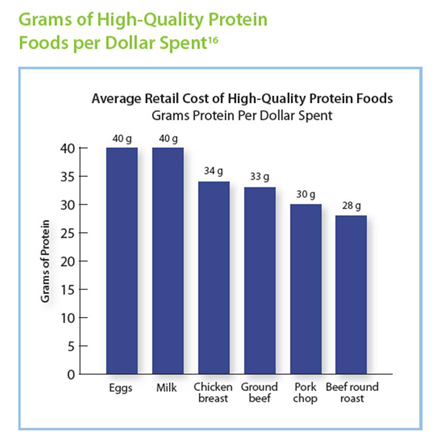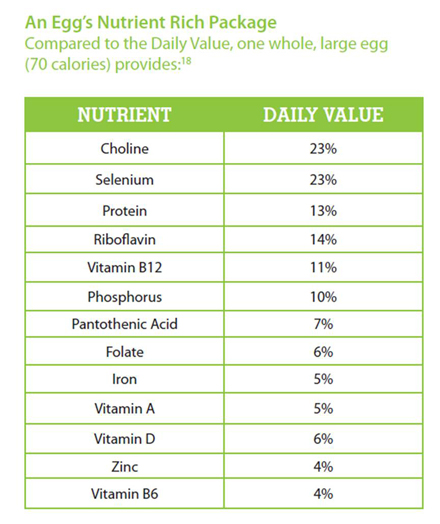Nutrition and Research
New research demonstrates that dietary protein intakes above minimum requirements can improve adult health and provide benefits for the treatment and prevention of diseases including obesity, osteoporosis, type 2 diabetes, metabolic syndrome, heart disease, and sarcopenia. Accepted dietary protein recommendations have long been based on the idea that eating a minimum amount of protein is valuable, but consuming more than the minimum offers no further value. In reality, there is scientific evidence that consuming the low-end range of the Recommended Daily Allowance (RDA) for protein may be a health liability and that adults may benefit from higher protein intake.
Protein is found in foods that come from both animals and plants, but the quality of protein is not the same in these foods. The protein in foods that come from animals, such as eggs, lean beef and pork, skinless poultry, fish and low-fat dairy, is called high-quality protein. High-quality protein foods are important food choices because they provide all of the essential amino acids in the correct proportions that the body needs as building blocks for new proteins.
The Important Role of Dietary Protein in Human Health
More than 40 percent of the bodys protein is found in skeletal muscle and more than 25 percent is found in organs. Protein is essential for a healthy diet because it provides amino acids that allow the body to synthesize its own proteins and other nitrogen-containing molecules that make life possible. There are 20 amino acids and of those, nine are essential phenylalanine, valine, threonine, tryptophan, isoleucine, methionine, leucine, lysine and histidine. Dietary protein is the primary source of both the nine essential or indispensable amino acids and the 11 nonessential or dispensable amino acids. Each amino acid is required in the right amounts to make the thousands of proteins in the human body.
High Quality Protein Affordability and Versatility
Foods that contain all nine essential amino acids are called complete or high-quality protein foods and the majority of these are animal proteins such as eggs, milk, lean beef and pork, skinless poultry and fish. Plant sources of protein, such as beans, nuts, seeds and legumes also provide protein, but plant proteins contain inadequate amounts of one or more of the nine essential amino acids.
Many consumers believe that high-quality protein foods are expensive, but in reality there are a variety of affordable protein food sources available in todays marketplace.

Protein for Active Adults
Research to assess the effects of diet composition in physically active individuals found that a diet high in protein (30% of total calories)and reduced in carbohydrates improved body composition in women when combined with exercise. In fact, participants who increased protein to 1.6 grams of protein per kilogram of body weight and decreased carbohydrate consumption while maintaining exercise lost more total weight and fat mass and better maintained lean mass than those who ate more carbohydrates and less protein while exercising.
Dietary protein intake (up to 1.6 grams of protein per kilogram daily) may enhance response to resistance exercise. In elderly men and women, the use of a protein-calorie supplement was associated with greater strength and muscle mass gains when compared with a placebo. Results of this study* found that compared with older subjects, young people tend to have a greater increase in plasma amino acid concentration after the consumption of protein, which supports improved muscle synthesis.
Finally, some recent research suggests that a combination of protein and carbohydrate after exercise may enhance muscle recovery and minimize exercise-induced tissue damage. Studies have also indicated that muscle glycogen synthesis is greater post exercise when protein and carbohydrate are consumed versus carbohydrate alone, suggesting a greater ability to prepared for subsequent exercise bouts.
*Evans WJ. Protein nutrition, exercise and aging. J Am Coll Nutr 2004;23:601S-9S
Eggs are an all-natural source of high-quality protein, and at an average of 15 cents each, eggs are an affordable, nutrient-rich option for people of all ages. Eggs are an all-natural source of high-quality protein, and at an average of 15 cents each, eggs are an affordable, nutrient-rich option for people of all ages.17 Eggs are one of the highest-quality protein sources of any food available, and for this reason scientists often use eggs as the standard for measuring the protein quality of other foods. Eggs are also an excellent (20% or more of the Daily Value) or good source (10-19% of the Daily Value) of the following nutrients compared to the Daily Value (based on a 2,000 calorie diet)

About the Egg Nutrition Center (ENC)
ENC monitors scientific findings and regulatory developments, and serves as a resource for health practitioners in need of current nutrition information to share with their patients. Click here to read more.
Nutrient Rich Foods Coalition
The Nutrient Rich Foods Coalition is a partnership that brings together leading scientific researchers, health professionals, communications experts, and agricultural commodity organizations. Members are composed of 21 agricultural commodity organizations that represent the five basic food groups. Click here to read more.
This research library is a collection of selected protein research published in respected peer-reviewed journals. Here you will find links to study abstracts, as well as links to the journals where you can download or purchase full-text research manuscripts. The library is organized according to the following focus areas:
Dietary Protein in Human Health
Dietary Protein in Human Health
Heaney RP, Layman DK. Amount and type of protein influences bone health. Am J Clin Nutr 2008;87:1567S-70S.
Click here for abstract | Click here to link to the free full-text.
Layman DK, Clifton P, Gannon MC, Krauss RM, Nuttall FQ. Protein in optimal health: heart disease and type 2 diabetes. Am J Clin Nutr 2008;87:1571S-5S.
Click here for abstract | Click here to link to the free full-text.
Pelletier, X, Thouvenot P, Belbraouet S, Chayvialle JA, Hanesse B, Mayeux D, Debry G. Effect of egg consumption in healthy volunteers: influence of yolk, white or whole-egg on gastric emptying and on glycemic and hormonal responses. Ann Nutr Metab 1996;40:109-15.
Click here for abstract | Click here to link to the free full-text.
Rodriguez NR, Garlick PJ. Introduction to Protein Summit 2007: Exploring the impact of high-quality protein on optimal health. Am J Clin Nutr 2008;87:1551S3S.
Click here for abstract | Click here to link to the free full-text.
Evans WJ. Protein nutrition, exercise and aging. J Am Coll Nutr 2004;23:601S-9S.
Click here for abstract | Click here to link to the free full-text.
Satiety and Weight Loss
Paddon-Jones D, Westman E, Mattes RD, Wolfe RR, Astrup A, Westerterp-Plantenga M. Protein, weight management, and satiety. Am J Clin Nutr 2008;87:558S-61S.
Click here for abstract | Click here to link to the free full-text.
Krieger JW, Sitren HS, Daniels MJ, Langkamp-Henken B. Effects of variation in protein and carbohydrate intake on body mass and composition during energy restriction: a meta-regression. Am J Clin Nutr 2006;83:260-74.
Click here for abstract | Click here to link to the free full-text.
Layman DK, Walker DA. Protein importance of leucine in treatment of obesity and the metabolic syndrome. J Nutr 2006;136:319S-23S.
Click here for abstract | Click here to link to the free full-text.
Layman DK, Shiue H, Sather C, Erickson DJ, Baum J. Increased dietary protein modifies glucose and insulin homeostasis in adult women during weight loss. J Nutr 2003;133:405-10.
Click here for abstract | Click here to link to the free full-text.
Weigle DS, Breen PA, Matthys CC, Callahan HS, Meeuws KE, Burden PR, Purnell JQ. A high-protein diet induces sustained reductions in appetite, ad libitum caloric intake, and body weight despite compensatory changes in diurnal plasma leptin and ghrelin concentrations. Am J Clin Nutr 2005;82:41-8.
Click here for abstract | Click here to link to the free full-text.
Astrup A. The satiating power of protein a key to obesity prevention? 1,2 Am J Clin Nutr 2005;82:1-2.
Click here for abstract | Click here to link to the free full-text.
Batterham M, Cavanagh R, Jenkins A, Tapsell L, Plasqui G, Clifton P. High protein meals may benefit fat oxidation and energy expenditure in individuals with higher body fat. Nutrition & Dietetics 2008;65:246-52.
Click here for abstract | Click here to link to the free full-text.
Vander Wal JS, Marth JM, Khosla P, Jen C, Dhurandhar NV. Short-term effect of eggs on satiety in overweight and obese subjects. J AM Coll Nutr 2005;24:510-15.
Click here for abstract | Click here to purchase the full-text.
Layman DK, Evans E, Baum JI, Seyler J, Erickson DJ, Boileau RA. Dietary protein and exercise have additive effects on body composition during weight loss in adult women. Human Nutrition and Metabolism 2005;135:1903-10.
Click here for abstract | Click here to link to the free full-text.
Sacks FM, Bray GA, Carey VJ, Smith SR, Ryan DH, Anton SD, McManus K, Champagne CM, Bishop LM, Laranjo N, Leboff MS, Rood JC, de Jonge L, Greenway FL, Loria CM, Obarzanek E, Williamson DA. Comparison of weight-loss diets with different compositions of fat, protein, and carbohydrates. N Engl J Med 2009;360:859-73.
Click here for abstract | Click here to link to the free full-text.
Muscle Health and Sarcopenia
Paddon-Jones D, Short KR, Campbell WW, Volpi E, Wolfe RR. Role of dietary protein in the sarcopenia of aging. Am J Clin Nutr 2008;87:562S-6S.
Click here for abstract | Click here to link to the free full-text.
Paddon-Jones D, Rasmussen BB. Dietary protein recommendations and the prevention of sarcopenia. Curr Opin Clin Nutr Metab Care 2009;12:86-90.
Click here for abstract | Click here to link to the free full-text.
Rasmussen BB, Tipton KD, Miller SL, Wolf SE, Wolfe RR. An oral essential amino acid-carbohydrate supplement enhances muscle protein anabolism after resistance exercise. J Appl Physiol 2000;88:386-92.
Click here for abstract | Click here to link to the free full-text.
Symons TB, Sheffield-Moore M, Wolfe RR, Paddon-Jones D. A moderate serving of high-quality protein maximally stimulates skeletal muscle protein synthesis in young and elderly subjects. J Am Diet Assoc 2009;109:1582-6.
Click here for abstract | Click here to link to the free full-text.
Protein at Breakfast
Ratliff J, Leite JO, de Ogburn R, Puglisi MJ, VanHeest J, Fernandez ML. Consuming eggs for breakfast influences plasma glucose and ghrelin, while reducing energy intake during the next 24 hours in adult men. Nutrition Research 2010;30:96-103.
Click here for abstract | Click here to link to the free full-text.
Vander Wal JS,Gupta A, Khosla P, Dhurandhar NV. Egg breakfast enhances weight loss. Int J of Obesity 2008;32:1545-51.
Click here for abstract | Click here to link to the free full-text.
Rampersaud GC, Pereira MA, Girard BL, Adams J, Metzl JD. Breakfast habits, nutritional status, body weight, and academic performance in children and adolescents. J Am Diet Assoc 2005;105:743-60.
Click here for abstract | Click here to link to the free full-text.




